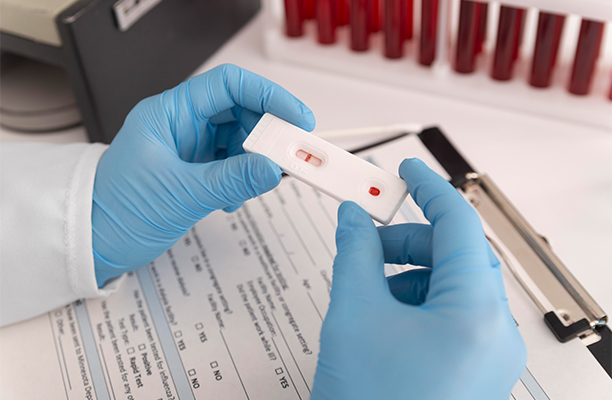There are three main types of COVID-19 tests: PCR, rapid antigen, and antibody tests. Here are the differences between them:
- PCR (Polymerase Chain Reaction) Test: This test detects the genetic material (RNA) of the virus in a person’s body. A healthcare provider takes a swab of mucus from the nose or throat, and the sample is sent to a laboratory for testing. PCR tests are considered the most accurate and reliable method for diagnosing COVID-19, with a sensitivity rate of 95-98%.
- Rapid Antigen Test: This test also detects viral proteins, but it delivers results in a matter of minutes. A healthcare provider uses a nasal or throat swab to collect a sample, and the test is performed on-site. Rapid antigen tests are less accurate than PCR tests, with a sensitivity rate of around 80-85%.
- Antibody Test: This test looks for the presence of antibodies in the blood, which indicates that a person has been infected with the virus in the past. Antibody tests do not detect the virus itself, so they cannot be used to diagnose an active infection. These tests can be useful for determining whether a person has already had COVID-19 and has developed immunity to the virus.
RT-PCR, or real-time polymerase chain reaction, is used to detect active COVID-19 infection. Samples for PCR tests can be taken by nasopharyngeal swab or saliva test. A saliva sample is less invasive than a nasopharyngeal sample. Like a nasal swab, a saliva test detects active covid-19 infection in patients who are experiencing symptoms or who have been exposed to the coronavirus. Although saliva tests are less commonly used than nasal swabs, the accuracy of the tests is very similar.

How it Works
The COVID-19 PCR (polymerase chain reaction) test is a diagnostic test used to detect the genetic material of the SARS-CoV-2 virus that causes COVID-19. RT-PCR works by making thousands of copies of this genetic material to assess whether a quality virus is present. The test only detects the virus while the person is currently infected.
PCR Test Accuracy
The PCR test is extremely accurate and can detect the smallest number of viruses. However, it is important to note that a negative result does not necessarily mean that the person is not infected with COVID-19, as the virus may not be present in the sample collected or may be present at levels below the detection limit.
If you take a PCR test on the day you were in contact with someone with COVID-19, you have a 100 percent chance of a false negative test result. For the most accurate results, health experts recommend getting tested about 7 days after exposure, or about 3-4 days after the onset of symptoms. Learn more about the accuracy of the specific test you are using.
Most PCR tests take several days to process (usually around 5 days). Some tests use fast PCs and return results within hours.
Where to Get a COVID-19 Test
Many cities have designated testing centers where you can test for covid-19. You can find these by contacting your local health department or searching online. Hospitals and clinics also offer HIV-19 tests, either through emergency rooms or through designated tests. For more information, ask your local doctor or hospital. Some pharmacies such as CVS, Walgreens, and Rite Aid offer COVID-19 testing. Visit their website for more information on locations and availability. Some states and cities are deploying mobile testing units in different regions to improve access to testing. Contact your local health department for more information.

